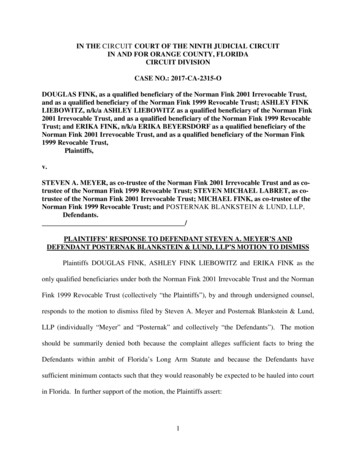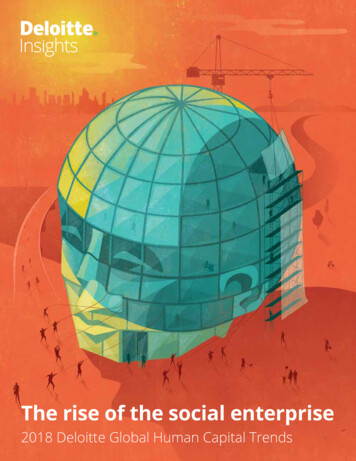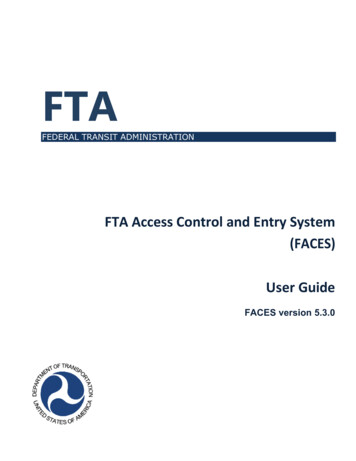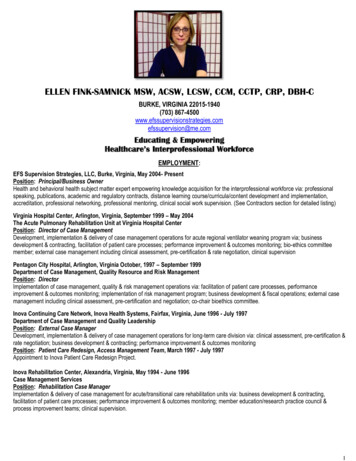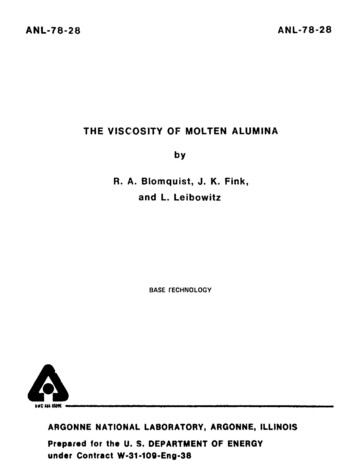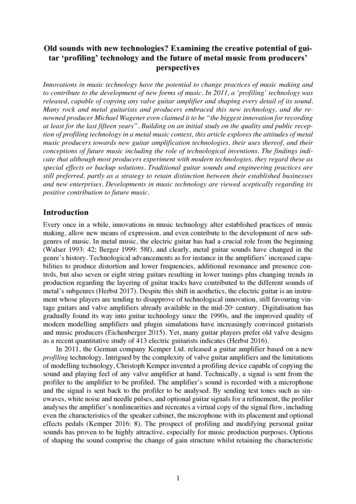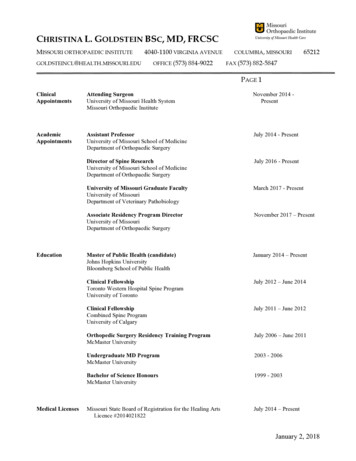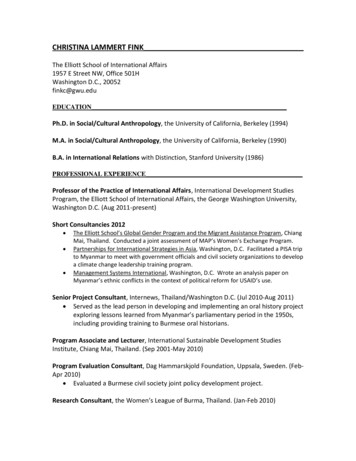
Transcription
CHRISTINA LAMMERT FINKThe Elliott School of International Affairs1957 E Street NW, Office 501HWashington D.C., 20052finkc@gwu.eduEDUCATIONPh.D. in Social/Cultural Anthropology, the University of California, Berkeley (1994)M.A. in Social/Cultural Anthropology, the University of California, Berkeley (1990)B.A. in International Relations with Distinction, Stanford University (1986)PROFESSIONAL EXPERIENCEProfessor of the Practice of International Affairs, International Development StudiesProgram, the Elliott School of International Affairs, the George Washington University,Washington D.C. (Aug 2011-present)Short Consultancies 2012 The Elliott School’s Global Gender Program and the Migrant Assistance Program, ChiangMai, Thailand. Conducted a joint assessment of MAP’s Women’s Exchange Program.Partnerships for International Strategies in Asia, Washington, D.C. Facilitated a PISA tripto Myanmar to meet with government officials and civil society organizations to developa climate change leadership training program.Management Systems International, Washington, D.C. Wrote an analysis paper onMyanmar’s ethnic conflicts in the context of political reform for USAID’s use.Senior Project Consultant, Internews, Thailand/Washington D.C. (Jul 2010-Aug 2011) Served as the lead person in developing and implementing an oral history projectexploring lessons learned from Myanmar’s parliamentary period in the 1950s,including providing training to Burmese oral historians.Program Associate and Lecturer, International Sustainable Development StudiesInstitute, Chiang Mai, Thailand. (Sep 2001-May 2010)Program Evaluation Consultant, Dag Hammarskjold Foundation, Uppsala, Sweden. (FebApr 2010) Evaluated a Burmese civil society joint policy development project.Research Consultant, the Women’s League of Burma, Thailand. (Jan-Feb 2010)
Christina FinkFounder, Coordinator, and Lead Instructor, Burmese Foreign Affairs Training Programfor Civil Society Organizations, Chiang Mai, Thailand. (2001- 2009)Curriculum Developer and Instructor, The International Women’s Development Agency,Chiang Mai, Thailand. (Feb -Jun 2008)Program Evaluation Consultant, the Canadian International Development Agency,Ottawa, Canada. (Oct-Nov 2003) Evaluated Burmese refugee-related capacity-building projects in Thailand.Research Consultant on Burmese Civil Society, the International Crisis Group, ChiangMai, Thailand. (August-Oct 2001) Researched and wrote a 40 page report on civil society in Burma/Myanmar.Program Evaluation Consultant, the National Endowment for Democracy, WashingtonD.C. (Nov 1999-May 2000) Conducted an evaluation of grants to ethnic groups and coalitions on Burma’sborders and produced a report.Visiting Scholar, the University of California, Berkeley. (Feb 1999-Jun 2000)Project Coordinator, the Open Society Institute’s Burma Project, Chiang Mai, Thailand.(Jan 1996-Jan 1998)Visiting Lecturer, the Department of Pacific and Asian Studies, University of Victoria,Canada. (Jan-Apr 1995)PUBLICATIONSBooksLiving Silence in Burma: Surviving Under Military Rule, London: Zed Books, 2009(1st edition entitled Living Silence: Burma Under Military Rule, Zed Books, 2001).Converging Interests: Traders, Travelers, and Tourists in Southeast Asia, ed. by JillForshee, with Christina Fink and Sandra Cate. Berkeley, California: International AreaStudies, UC Berkeley, 1999.Journal Articles and Book Chapters“Myanmar’s Proactive National Parliament,” Social Research, Vol. 82(2) Summer 2015."Re-envisioning Land Tenure and Land Use," in David I Steinberg, ed., Myanmar:Dynamics of an Evolving Polity, Boulder, CO, Lynne Rienner, 2015.2
Christina Fink“Burmese Sanctuary-Seekers and Migrants in Thailand: Policies, Experiences, andProspects,” in Kathleen Allden and Nancy Murakami, eds., Trauma and Recovery onWar’s Border: A Guide for Global Health Workers, Hanover: Dartmouth College Press,2015."How Real are Myanmar's Reforms," Current History, Vol. 113(764), September 2014.“Relieving Burma’s Humanitarian Crisis,” Burma or Myanmar? The Struggle for NationalIdentity, ed. by Lowell Dittmer. Hackensack, NJ: World Scientific, 2010.“Burma 2007: The Moment of the Monks,” Civil Resistance and Power Politics: TheExperience of Non-violent Action from Gandhi to the Present, ed. by Adam Roberts,Timothy Garton Ash, and Thomas R. Davies. Oxford: Oxford University Press, 2009.“Ongoing Militarization in Burma’s Ethnic States: Causes and Consequences,”Contemporary Politics, Vol. 14, Issue 4, 2008, pp. 447-462.“Living for Funerals: Karen Teenagers and Romantic Love,” Living at theEdge of Thai Society: The Karen in the Highlands of Northern Thailand, ed. by ClaudioDelang. New York: Routledge, 2003.“Ethnic Politics at the Periphery,” Burma Debate (online version), Fall 2003.“Introduction,” Burma and the Karens, by Dr. San C. Po, Bangkok: White Lotus,2001[1928].Myanmar: The Role of Civil Society. Brussels: International Crisis Group, December 6,2001.“The Pressures to Conform: Burmese Society Under Military Rule,” Burma Debate, Fall2000.“An Overview of Burma’s Ethnic Politics,” Cultural Survival, Fall 2000.“Visit Myanmar Year: Tourism in Burma,” Converging Interests: Traders, Travelers, andTourists in Southeast Asia, ed. by Jill Forshee, with Christina Fink and Sandra Cate.International Area Studies, UC Berkeley, 1999.“Burma: Constructive Engagement in Cyberspace,” Cultural Survival, Winter 1998.“Human Rights Across Borders: Karen Experiences in Thailand and Burma,” BurmaDebate, Vol. 1(3), December 1994/January 1995.3
Christina Fink“Kaan Du Kong Kariang (Karen Sorcery),” Tribal Research Institute Quarterly (Thailand),Vol. 17 (1-2), January-June 1993 (in Thai).SELECTED PRESENTATIONS (2012-2015)“Post-Election Scenarios and Government Formation,” Informal Consultation on theElections in Myanmar, Social Science Research Council Conflict Prevention and PeaceForum, New York City, NY, September 11, 2015.“Domestic Politics: Reform, Human Rights, and Religion,” Burma’s Road to Democracy,the US Department of State, Washington D.C., July 28, 2015.“Myanmar’s Ethnic, Communal, and Human Rights Challenges and the 2015 Elections,”the Carnegie Endowment for International Peace, Washington D.C., July 22, 2015."Burma and the Peace Process", Briefing for Congressional Staff Members, theRayburn House Office Building, Washington, D.C. May 2015."Myanmar's Upcoming Elections and the Fate of the Reform Process", co-hosted by theSigur Center for Asian Studies at the Elliott School of International Affairs and the SOAS,Alumni Association, The Elliott School of International Affairs, Washington, D.C.February 11, 2015.“Moving the Burmese Military Back to the Barracks: Constitutional Challenges",International Forum for Democratic Studies, National Endowment for Democracy,Washington, D.C., January 30, 2015."Myanmar’s Role in Building a People-Centered ASEAN Socio-Cultural Community",Moving Forward in Unity: United States, ASEAN, and EAS Perspectives, the ASEANStudies Center at American University (co-sponsored by the State Department and theAsia Foundation), Washington, D.C., October 23, 2014."Assessing Burma's Reforms," Burma Roundtable, USAID, Washington, D.C. September25, 2014."Land Rights and Land Tenure in Myanmar," Land, Property and Conflict ShortCourse at the United States Institute of Peace (co-sponsored by IOM, the World BankJustice for the Poor program, and USAID), Washington D.C., September 17, 2014.“The Progression of Democratic Reform in Burma,” in conjunction with the release ofIRI’s First Survey of Burmese Public Opinion, co-hosted by the International RepublicanInstitute and the National Endowment for Democracy, Washington, D.C., April 3, 2014.4
Christina Fink“Land Use and Land Rights in Myanmar,” Myanmar: The Dynamics of Positive Change,Annual Asian Studies Conference, Philadelphia, Pennsylvania, March 28, 2014.“Political Reforms and the Media in Myanmar,” Myanmar: Fresh Perspectives on theBusiness of Media and the Information Environment, Internews, Washington D.C.,February 26, 2014.“Land Conflicts and Land Reform in Myanmar,” Center for Strategic and InternationalStudies, Washington D.C. January 16, 2014.“Assessing Myanmar’s Political and Economic Transformation,” Myanmar in ASEAN:Opportunities and Challenges Ahead for the 2014 ASEAN Chair, American University,Washington D.C., December 4, 2013.“Re-envisioning Land Rights and Land Tenure in Myanmar,” Myanmar: The Dynamics ofPositive Change, SAIS, Washington D.C., September 23, 2013.“Burma: Civil-Military Relations,” Burma: Prospects for Stability and Governance, the USDepartment of State, Washington, D.C., September 13, 2013.“Implications for Human Security through Political and Economic Reform,” Burma inTransition: Climate Wise Development and Sustainable Finance, Partnerships forInternational Strategies in Asia, the Elliott School of International Affairs, Washington,D.C., October 24, 2012.5
Christina Fink 5 "Land Use and Land Rights in Myanmar," Myanmar: The Dynamics of Positive Change, Annual Asian Studies Conference, Philadelphia, Pennsylvania, March 28, 2014. "Political Reforms and the Media in Myanmar," Myanmar: Fresh Perspectives on the Business of Media and the Information Environment, Internews, Washington D.C., February 26, 2014.
